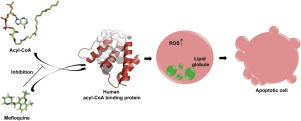当前位置:
X-MOL 学术
›
Neurotoxicology
›
论文详情
Our official English website, www.x-mol.net, welcomes your
feedback! (Note: you will need to create a separate account there.)
Mefloquine binding to human acyl-CoA binding protein leads to redox stress-mediated apoptotic death of human neuroblastoma cells.
NeuroToxicology ( IF 3.4 ) Pub Date : 2020-01-24 , DOI: 10.1016/j.neuro.2020.01.006 Abhishek Kumar 1 , Debasish Kumar Ghosh 2 , Akash Ranjan 2
NeuroToxicology ( IF 3.4 ) Pub Date : 2020-01-24 , DOI: 10.1016/j.neuro.2020.01.006 Abhishek Kumar 1 , Debasish Kumar Ghosh 2 , Akash Ranjan 2
Affiliation

|
Malaria is an infectious disease that is caused by different species of Plasmodium. Several antimalarial drugs are used to counter the spread and infectivity of Plasmodium species. However, humans are also vulnerable to many of the antimalarial drugs, including the quinoline-based drugs. In particular, the antimalarial mefloquine has been reported to show adverse neuropsychiatric effects in humans. Though mefloquine is known to be neurotoxic, the molecular mechanisms associated with this phenomenon are still obscure. In this study, we show that mefloquine binds to and inactivates the human acyl-CoA binding protein (hACBP), potentially inducing redox stress in human neuroblastoma cells (IMR-32). Mefloquine occupies the acyl-CoA binding pocket of hACBP by interacting with several of the critical acyl-CoA binding amino acids. This leads to the competitive inhibition of acyl-CoA(s) binding to hACBP and to the accumulation of lipid droplets inside the IMR-32 cells. The accumulation of cytosolic lipid globules and oxidative stress finally correlates with the apoptotic death of cells. Taken together, our study deciphers a mechanistic detail of how mefloquine leads to the death of human cells by perturbing the activity of hACBP and lipid homeostasis.
中文翻译:

甲氟喹与人酰基辅酶A结合蛋白的结合导致氧化还原应激介导的人神经母细胞瘤细胞凋亡的死亡。
疟疾是由不同种类的疟原虫引起的传染性疾病。几种抗疟药用于抵抗疟原虫物种的传播和传染性。但是,人类也容易受到许多抗疟疾药物的影响,包括基于喹啉的药物。特别是,据报道抗疟药甲氟喹对人显示出不良的神经精神病学作用。尽管已知甲氟喹具有神经毒性,但与这种现象相关的分子机制仍然不清楚。在这项研究中,我们显示甲氟喹与人酰基辅酶A结合蛋白(hACBP)结合并使其失活,从而可能在人神经母细胞瘤细胞(IMR-32)中诱导氧化还原应激。甲氟喹通过与几个关键的酰基辅酶A结合氨基酸相互作用而占据了hACBP的酰基辅酶A结合口袋。这导致竞争性抑制酰基辅酶A与hACBP的结合以及IMR-32细胞内脂质小滴的积累。胞浆脂质小球的积累和氧化应激最终与细胞凋亡死亡相关。综上所述,我们的研究破译了甲氟喹如何通过干扰hACBP的活性和脂质稳态来导致人类细胞死亡的机制细节。
更新日期:2020-01-24
中文翻译:

甲氟喹与人酰基辅酶A结合蛋白的结合导致氧化还原应激介导的人神经母细胞瘤细胞凋亡的死亡。
疟疾是由不同种类的疟原虫引起的传染性疾病。几种抗疟药用于抵抗疟原虫物种的传播和传染性。但是,人类也容易受到许多抗疟疾药物的影响,包括基于喹啉的药物。特别是,据报道抗疟药甲氟喹对人显示出不良的神经精神病学作用。尽管已知甲氟喹具有神经毒性,但与这种现象相关的分子机制仍然不清楚。在这项研究中,我们显示甲氟喹与人酰基辅酶A结合蛋白(hACBP)结合并使其失活,从而可能在人神经母细胞瘤细胞(IMR-32)中诱导氧化还原应激。甲氟喹通过与几个关键的酰基辅酶A结合氨基酸相互作用而占据了hACBP的酰基辅酶A结合口袋。这导致竞争性抑制酰基辅酶A与hACBP的结合以及IMR-32细胞内脂质小滴的积累。胞浆脂质小球的积累和氧化应激最终与细胞凋亡死亡相关。综上所述,我们的研究破译了甲氟喹如何通过干扰hACBP的活性和脂质稳态来导致人类细胞死亡的机制细节。











































 京公网安备 11010802027423号
京公网安备 11010802027423号